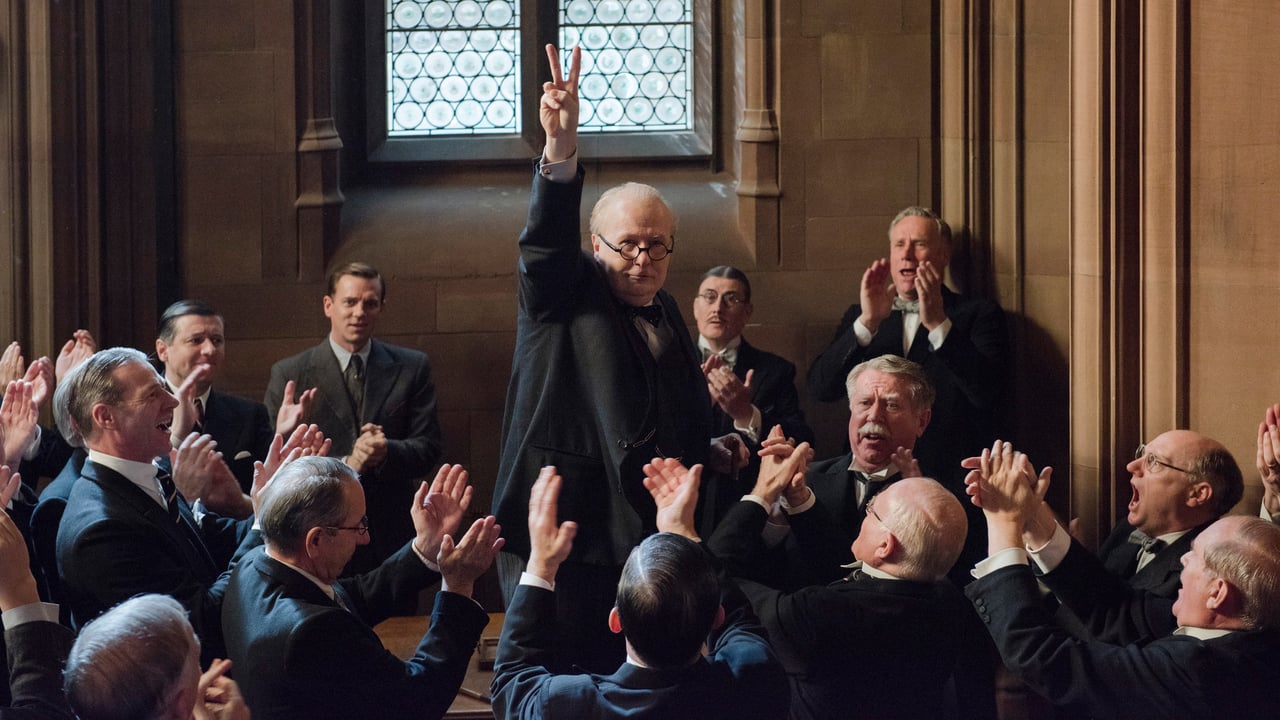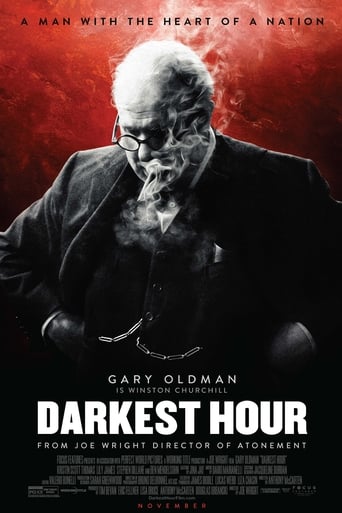Huievest
Instead, you get a movie that's enjoyable enough, but leaves you feeling like it could have been much, much more.
catchmadhav16
In the era of military operations, evacuation missions and sentiment injected war dramas, we have often failed to realize that another side of a coin that makes a currency whole. Rewinding back to 1940, World War 2, to peril inflicted locations mainly Britain and France, "Darkest Hour" showcases the retelling of the parallels of the Dunkirk evacuation. This movie boasts from a grounded point of view, exploring the very basic human emotions like regret, self-doubt, and courage embedding them all together in a beautiful mixture of political fiascos. Parliament debates, votes, political thrills all stuffed inside the same hat, particularly the hat happens to pertain to Sir Winston Churchill (Gary Oldman).downloadThe film explores Churchill's early controversial days while being surrounded by the close-to-the-chest rivals in his cabinet. There is a constant threat of the Nazis being precariously close to annexing the United Kingdom at the backdrop, leading to a linear increase of the anxiety till the end of the film. The hopelessness of Chamberlain's perspective, the edginess during cabinet meetings and Churchill's eccentricity form the backbone of the movie.The atmosphere of the movie is inculcated in the very first scene, where Neville Chamberlain (Ronald Pickup) is accused of being incapable of leading the parliament. The typical scenario of a house packed political debate replete with grey haired individuals making Klaxons sound futile unfolds smoothly. When Winston Churchill assumes the position of Prime Minister in the very beginning, it's the balance of the modern world resting on his shoulders which he realizes soon enough.When peace seemed to be crucial to be attained at any cost, Churchill's opposite perspective creates a rift among the members and the Prime Minister. His clear struggle to establish a balance between the crisis and the tempting desire to yield to surrender is beautifully depicted adding a human ground to an eccentric roof.When wars are waged, the swords and guns are the ones which are eagerly taken out initially. We fail to acknowledge the presence of words and oration that can truly make a difference sparing the arms and ammunition to a far greater extent. The way diplomacy, when done right can play an important role is slightly highlighted which pinpoints modern-day leaders. The powerful speech cementing their unbreakable faith to protect their Homeland, "We shall fight on the beaches", is a very testament to the finest degrees of oration, and how language can change the course of action. Indeed, "Churchill just mobilized the English language and sent it into battle." Gary Oldman's performance is perhaps one of his lifetimes. Buried under deep prosthetics deeming him unrecognizable, he submerges himself into the grumpy character of Churchill making us live his very experiences. The tantrum throwing man-child, the fierce but emotionally frail carrying the weight of the world was depicted as a fascinating historical figure cementing that history wouldn't have been the same without him. Supporting characters were adjusted here and there, like King George VI(Ben Mendelsohn), downplaying his stammering defect, was a surprising but satisfying casting. Elizabeth (Lily James), the typist girl was depicted as a victim of Churchill's eccentricity and was more of an onlooker to the events around her. Winston's wife, Clemmie (Kristin Scott Thomas) was perhaps the most underused yet useful additions in the script. Her unbreakable faith in her husband was an homage to the fact that a man under pressure needs nothing but love and support from his loved ones.The game changer, however, was the London tube sequence where all the boundaries of caste, race, religion, and prejudice were demolished. A narrative device perhaps meant to moisten the eyes was perhaps the most defining sequence of the film out of the deck. However, the credibility of such a sequence was questionable as the fact that a decision could be taken just through an interaction between civilians quite briefly was borderline cringe-worthy.As historical and peril stricken this movie claimed to be, there were a few melodramatic moments that did pull it down. The over-saturation of Churchill's presence in every frame felt moderately claustrophobic; especially when the necessity to show him taking a dump was considered. It didn't end up being a gem, as it was masqueraded but more of a significant watch. Perhaps the multiple takes on the World Wars have stagnated its genre, or maybe because of Christopher Nolan's recent take on Dunkirk. Many parallels can be drawn from both films that cross cut at various points considering that one of them is a behind the scene story and the latter a war ground drama (prequels anyone?). Churchill's courage and determination throughout is something commendable that not many world leaders would warm up to today. It's a queer disappointment that the narrative was lost somewhere in the fumes of war and Winston's vices. Nevertheless, a political drama that prolifically combines human nature, the war inside and outside themselves and a bearable history lesson for all prove more informative than your basic history lesson. Towards the end, we'd end up surprised how many times the phrase- "We shall never surrender" can hum in our ears.
justin-fencsak
Last year two major movies came out, both about the same subject, the invasion and then rescue of men from Dunkirk during World War II. One was a big budget war movie directed by Christopher Nolan, Dunkirk, that was shot entirely with a blend of Imax and 70mm cameras and became the biggest war movie since Saving Private Ryan. The other, this one, gained critical acclaim and received some awards. That movie tells the story of how Winston Churchill (played greatly by Gary Oldman) overcame the odds and became a popular prime minister who delivered his famous "Never Surrender" speech years before the end of World War II. Unlike Dunkirk, this movie has no violence at all but thematic elements of war that might be a bit scary for little kids. Worth a rental on bluray.

